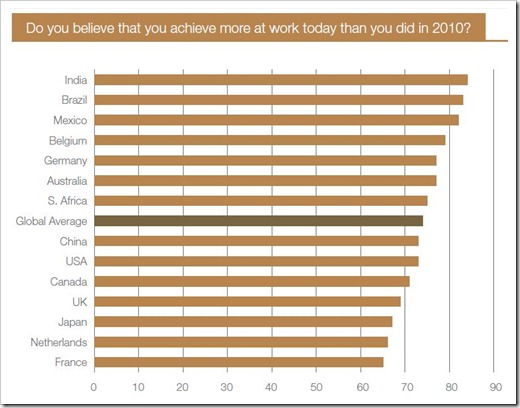A Regus Work-Life Balance Index Survey carried out in May 2012 noted that Indian employees were much happier with their work-life Balance as compared to 2010. In addition to India, nations like Mexico, Japan and Brazil too had a high number of respondents showing increased satisfaction in their jobs and an improvement in their work-life balance than before.
The Regus survey collected responses from 16,000 businesses professional in 80 countries. The elements taken into consideration were working hours, commuting time to the workplace, satisfaction in the quality of family time obtained and a comparison to employees’ work-life balance in the past. A similar survey was carried out by Regus in 2010.
The results from the 2012 survey have been benchmarked against a base score of 100 from 2010. A clear 15% positive rise was seen in the 2012 results as compared to 2010.

80% employees in India enjoyed their work more in 2012 than what they did in 2010. After Brazil, India stood at the second position in the category that measured how much effort companies were putting to help employees decrease their travel time to work. At 57%, India was well above the global average which stood at 42%.
India also ranked fairly well in the category which measured employee satisfaction in the quality of time they spent with their family. India matched the Global Average of 59%. Netherlands topped this category with a whopping 69%.
India topped the charts when it came to work life enjoyment and achievement – 84% Indians believed they achieved more at work today than they did in 2010.

Taking into account all these factors, India’s overall Regus Work-Life Balance Index score came to 139. This was much higher to the Global Average of 124. According to Madhusudan Thakur, Regional Vice President South Asia at Regus, this clearly affirms that like the West, India Inc has now begun to employ processes that help their employees maintain work-life balance. This could be possible by helping employees work from home for certain days, adjusting maternity leave or helping employees to reduce their commuting time.
By establishing a directly proportional relationship between an employee’s personal happiness and his/her productivity at work, the Regus Survey attempts to help organizations retain valuable talent by offering flexible work practices.
Interestingly the Ma Foi Randstad Workmonitor Survey 2012 conducted in April 2012 brought forth a unique observation. The survey stated that Indian employees considered technological advancements to be the culprit in eating into their work-life Balance. Reporting on the survey, TOI quoted respondents saying that on one hand technology made their work more efficient but on the other hand it was intruding deeper and deeper into their personal lives.
Work-life balance as a corporate concept has gained popularity in India in the recent years. In western countries, work-life balance is taken very seriously. A 5 pm finishing time means 5 pm and weekends off means a 5 day work week.
Moreover, specialist HR personnel work hard to maximize this concept to keep employees at peak efficiencies. While this ideology has gained momentum and as the survey points out, India Inc has made improvements, work-life balance in India still has quite a lot of ground to cover.

Definitely, balancing work life is very important for everyone. Lots of factors which affects one’s work life balance. Some of them are- leave encashment, satisfaction of job, company environment etc. so to balance work life one should look all the factors.